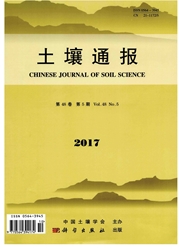

 中文摘要:
中文摘要:
通过温室盆栽试验,研究了套作双孢蘑菇(Agaricus bisporus)对潮土速效养分含量、微生物数量、关键酶活性以及番茄(Lycopersicon esculentum Mill.)生长的影响。结果发现,与对照相比,添加双孢蘑菇培养基质对土壤有机碳、矿质氮与速效磷含量均没有显著影响,但速效钾含量显著增加(P〈0.05),且土壤细菌数量趋于增加、真菌数量显著减少(P〈0.05),土壤脲酶与磷酸酶活性显著增强(P〈0.05)、纤维素酶活性显著下降(P〈0.05),番茄植株地上部和地下部生物量分别增加130%和67%,但产量没有明显变化;在添加培养基质基础上再接种双孢蘑菇菌种与不接种相比显著降低土壤有机碳含量和脲酶活性(P〈0.05),番茄植株生物量也降到与对照相接近的水平,尽管番茄产量没有明显变化,但额外收获了双孢蘑菇。结果表明,套作双孢蘑菇对潮土生物活性具有促进作用,并可以增加单位面积经济产出,因而在潮土地区具有推广潜力。
 英文摘要:
英文摘要:
A pot experiment in greenhouse was carried out to investigate the effects of intercropping mushroom(Agaricus bisporus) on soil available nutrient contents,microbial population sizes,enzyme activities and tomato(Lycopersicon esculentum Mill.) growth in a fluvo-aquic soil.The amendment of substrate of mushroom had no significant effects on soil organic carbon,mineral nitrogen and available phosphorus,as well as fruit yield of tomato,while had a positive effect on soil available potassium content,bacterial population size,urease and phosphate activities,as well as vegetative biomass of tomato plants,and had negative effects on soil fungal population size and cellulose activity.However,the inoculation of mushroom strain Zhejiang 20 significantly decreased(P 0.05) soil organic carbon,urease activities,and vegetative biomass of tomato plants compared with the treatment without inoculation.In the intercropping treatment,extra mushroom was also harvested with undeclined fruit yield of tomato compared to the control.It suggested that the mushroom-vegetable intercropping system could enhance soil biological activities as well as economic yield,and could be applied in fluvo-aquic soils.
 同期刊论文项目
同期刊论文项目
 同项目期刊论文
同项目期刊论文
 期刊信息
期刊信息
